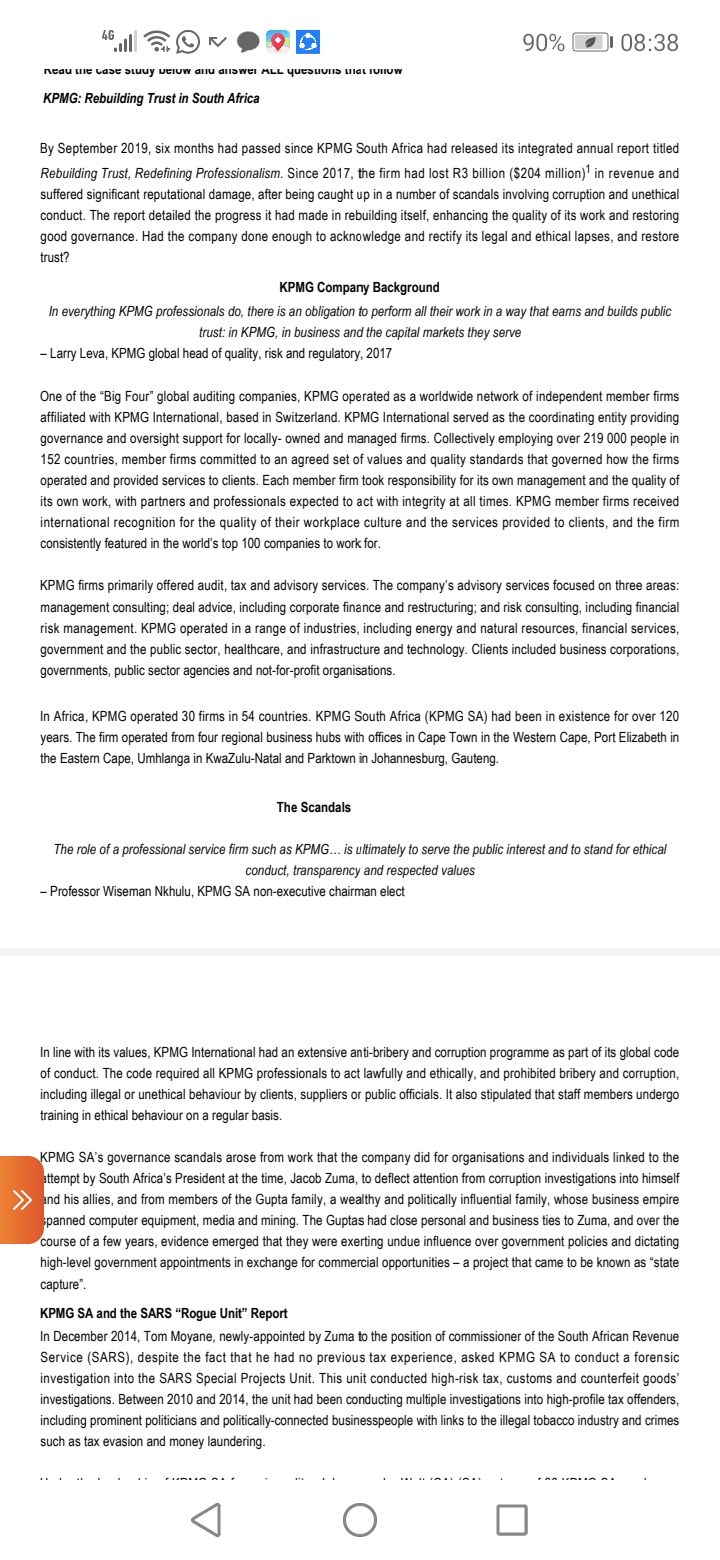Answered step by step
Verified Expert Solution
Question
1 Approved Answer
Formulate a problem statement, the aims of your study, and two objectives. Substantiate these elements with evidence in the case. 46 90% 08:38 KPMG: Rebuilding

Formulate a problem statement, the aims of your study, and two objectives. Substantiate these elements with evidence in the case.
46 90% 08:38 KPMG: Rebuilding Trust in South Africa By September 2019, six months had passed since KPMG South Africa had released its integrated annual report titled Rebuilding Trust, Redefining Professionalism. Since 2017, the firm had lost R3 billion (\$204 million) 1 in revenue and suffered significant reputational damage, after being caught up in a number of scandals involving corruption and unethical conduct. The report detailed the progress it had made in rebuilding itself, enhancing the quality of its work and restoring good governance. Had the company done enough to acknowledge and rectify its legal and ethical lapses, and restore trust? KPMG Company Background In everything KPMG professionals do, there is an obligation to perform all their work in a way that eams and builds public trust: in KPMG, in business and the capital markets they serve - Larry Leva, KPMG global head of quality, risk and regulatory, 2017 One of the "Big Four" global auditing companies, KPMG operated as a worldwide network of independent member firms affiliated with KPMG International, based in Switzerland. KPMG International served as the coordinating entity providing governance and oversight support for locally- owned and managed firms. Collectively employing over 219000 people in 152 countries, member firms committed to an agreed set of values and quality standards that governed how the firms operated and provided services to clients. Each member firm took responsibility for its own management and the quality of its own work, with partners and professionals expected to act with integrity at all times. KPMG member firms received international recognition for the quality of their workplace culture and the services provided to clients, and the firm consistently featured in the world's top 100 companies to work for. KPMG firms primarily offered audit, tax and advisory services. The company's advisory services focused on three areas: management consulting; deal advice, including corporate finance and restructuring; and risk consulting, including financial risk management. KPMG operated in a range of industries, including energy and natural resources, financial services, government and the public sector, healthcare, and infrastructure and technology. Clients included business corporations, governments, public sector agencies and not-for-profit organisations. In Africa, KPMG operated 30 firms in 54 countries. KPMG South Africa (KPMG SA) had been in existence for over 120 years. The firm operated from four regional business hubs with offices in Cape Town in the Westem Cape, Port Elizabeth in the Eastern Cape, Umhlanga in KwaZulu-Natal and Parktown in Johannesburg, Gauteng. The Scandals The role of a professional service firm such as KPMG... is ultimately to serve the public interest and to stand for ethical conduct, transparency and respected values - Professor Wiseman Nkhulu, KPMG SA non-executive chairman elect In line with its values, KPMG International had an extensive anti-bribery and corruption programme as part of its global code of conduct. The code required all KPMG professionals to act lawfully and ethically, and prohibited bribery and corruption, including illegal or unethical behaviour by clients, suppliers or public officials. It also stipulated that staff members undergo training in ethical behaviour on a regular basis. KPMG SA's governance scandals arose from work that the company did for organisations and individuals linked to the ttempt by South Africa's President at the time, Jacob Zuma, to deflect attention from corruption investigations into himself and his allies, and from members of the Gupta family, a wealthy and politically influential family, whose business empire panned computer equipment, media and mining. The Guptas had close personal and business ties to Zuma, and over the course of a few years, evidence emerged that they were exerting undue influence over government policies and dictating high-level government appointments in exchange for commercial opportunities - a project that came to be known as "state capture". KPMG SA and the SARS "Rogue Unit" Report In December 2014, Tom Moyane, newly-appointed by Zuma to the position of commissioner of the South African Revenue Service (SARS), despite the fact that he had no previous tax experience, asked KPMG SA to conduct a forensic investigation into the SARS Special Projects Unit. This unit conducted high-risk tax, customs and counterfeit goods' investigations. Between 2010 and 2014, the unit had been conducting multiple investigations into high-profile tax offenders, including prominent politicians and politically-connected businesspeople with links to the illegal tobacco industry and crimes such as tax evasion and money launderingStep by Step Solution
There are 3 Steps involved in it
Step: 1

Get Instant Access to Expert-Tailored Solutions
See step-by-step solutions with expert insights and AI powered tools for academic success
Step: 2

Step: 3

Ace Your Homework with AI
Get the answers you need in no time with our AI-driven, step-by-step assistance
Get Started


